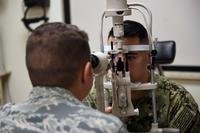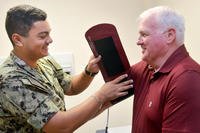 MILITARY UPDATE: Autism Care Coverage Improves, Patient Costs Still a Worry
MILITARY UPDATE: Autism Care Coverage Improves, Patient Costs Still a Worry
More than 26,000 military families with autistic children are getting better TRICARE coverage of applied behavior analysis (ABA) therapy and related services, which can improve a child’s development and quality of life.
But a Comprehensive Autism Care Demonstration that began a slow rollout in late October will still leave retirees and reserve component families facing heavy out-of-pocket costs to provide children with intensive ABA therapy that has become a standard of care, say advocates for families.
Defense Health Agency (DHA) officials say the demonstration, which is to run through December 2018 and is open to any military child diagnosed with autism, will be a platform for evaluating ABA therapy, a series of behavior interventions, to learn which ones benefit autism patients the most.
Army Maj. Gen. Richard W. Thomas, chief medical officer and director of healthcare operations for DHA, calls ABA therapy is an “emerging science.” Just as military has done for trauma care and other facets of health care delivery, Thomas sees the autism demonstration resulting in “new, innovative solutions to these patients” and discovery of best practices that are safe and effective.
He called the improved autism coverage a “very robust and generous benefit. We can’t find anything comparable to it on the outside…We have the most broad-based, generous benefit for patients with these diagnoses.”
A key feature of the demonstration removes an annual cap of $36,000 on TRICARE family coverage of ABA therapy costs. This will allow more children to receive comprehensive treatment levels, typically 25 to 40 hours of therapy per week. The old cap limited treatments to 12 hours a week.
“Families will finally have coverage of prescribed level of care. This is a very important development,” said Karen Driscoll, associate director for military relations at Autism Speaks, the nation’s largest funder of autism research and advocacy. Driscoll is married to a retired Marine and their oldest son has autism.
ABA therapy uses environmental modifications to produce socially significant changes in behavior of autistic children. It is endorsed by the U.S. Surgeon General and the American Academy of Pediatrics and is “the standard of care in the treatment of autism today,” Driscoll said.
For the demonstration, DHA combined three autism treatment programs into one, ending separate programs for active duty families, non-active duty families and an interim plan under court order that required TRICARE to offer ABA therapy as part of its basic benefit. Good riddance to an “administrative nightmare,” said one DHA official.
Three different programs delivering the same service in three different ways, Driscoll agreed, “was confusing to beneficiaries seeking care but also to providers, to referring physicians and [TRICARE support] contractors. So this is a big step to provide a uniform benefit for all those affected by autism.”
The program also removes a minimum age limit of 18 months to receive ABA therapy, as suggested by family advocates during a roundtable discussion hosted by DHA. The new program also improves timely access to services by simplifying diagnostic requirements for enrollment.
“I remain concerned about cost barriers that can block access to care for many children,” said Driscoll, particularly for non-active duty families.
While active duty families are assessed a flat monthly fee that varies by rank under tiered services model for ABA therapy, retirees and reserve component personnel face a 10 percent co-payment on ABA costs. That means $7300 a year out of pocket for a 25-hour-a-week program and $11,700 a year for a 40-hour-a-week treatment plan, none of which accrue to the family catastrophic cap.
Co-payments associated other outpatient treatment services do accrue against TRICARE caps that limit annual out-of-pocket medical costs to $1000 for users of TRICARE Reserve Select or to $3000 for retirees using TRICARE.
Because most ABA costs under the demonstration do not accrue to the family catastrophic cap, the cost share structure “may prevent many non-active duty family members from accessing recommended levels of care,” Driscoll said.
She can’t guess why autism outpatient services “are treated so differently.”
When DHA released more details on the autism care demonstration in September, it sparked outrage among parents for another reason: a proposed cut in payment rate for board-certified behavior analysts performing one-on-one ABA therapy. DHA wanted to cut the rate from $125 an hour to $68 for providing day-to-day therapy. The higher rate would only be paid when assessing a patient’s need or drawing up a treatment plan. Otherwise rates would fall 46 percent.
Thomas said TRICARE periodically must review and adjust reimbursement rates, and did so here.
“What we found is TRICARE paying well in excess of any others that were doing similar type work on the outside,” he said.
The proposed rate change appears to have been based in part on a recent survey of Medicaid rates for ABA therapy in 14 states, which found board-certified behavior analysts receiving payments that ranged from $35 up to $125 a hour.
But DHA didn’t anticipate the reaction from families. Many said they feared board certified behavior analysts would drop TRICARE patients and scuttle their child’s therapy. Driscoll predicted it indeed would impact “thousands of kids.”
DHA has shelved the rate change until next April, giving it time to consider a more thorough review of ABA therapy payment rates being conducted by the think tank RAND.
“I am grateful leadership intervened and will reconsider the impact this would have on current treatment plans and the adequacy of the network nationwide,” said Driscoll.
DHA also promises to have “appropriate strategic messaging” to explain any changes to beneficiaries and providers, something it failed to do a few months back.
The demonstration has had some startup “kinks,” Driscoll said, but senior leadership has been working with family advocates and other “stakeholders” to address a variety of concerns. More information on the demonstration can be found online at: www.health.mil/Military-Health-Topics/Conditions-and-Treatments/Autism-Care-Demonstration.
Send comments to Military Update, P.O. Box 231111, Centreville, VA, 20120, email milupdate@aol.com or twitter: Tom Philpott @Military_Update
# # # # #
Tom Philpott has been breaking news for and about military people since 1977. After service in the Coast Guard, and 17 years as a reporter and senior editor with Army Times Publishing Company, Tom launched "Military Update," his syndicated weekly news column, in 1994. "Military Update" features timely news and analysis on issues affecting active duty members, reservists, retirees and their families.
Visit Tom Philpott's Military Update Archive to view his past articles.
Tom also edits a reader reaction column, "Military Forum." The online "home" for both features is Military.com.
 Tom's freelance articles have appeared in numerous magazines including The New Yorker, Reader's Digest and Washingtonian. His critically-acclaimed book, Glory Denied, on the extraordinary ordeal and heroism of Col. Floyd "Jim" Thompson, the longest-held prisoner of war in American history, is available in hardcover and paperback.
Tom's freelance articles have appeared in numerous magazines including The New Yorker, Reader's Digest and Washingtonian. His critically-acclaimed book, Glory Denied, on the extraordinary ordeal and heroism of Col. Floyd "Jim" Thompson, the longest-held prisoner of war in American history, is available in hardcover and paperback.
Beneficiaries who had to pay for any of these 35 tests since coverage first was denied back to Jan. 1, 2013, might be eligible for reimbursement. Send comments to Military Update, P.O. Box 231111, Centreville, VA, 20120, email milupdate@aol.com or twitter: Tom Philpott @Military_Update



